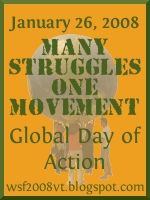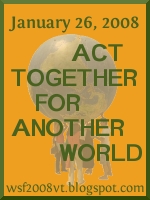At the end of January, thousands of people all over the world will march, speak, celebrate, and dialogue in villages, rural zones, and urban centers, in the context of hundreds of decentralized self-organized actions. They will mobilize over a one-week period in January, culminating in a Global Day of Mobilisation and Action on the 26th to show that another world is possible.
At the same period, the “old” world will meet in Davos for the World Economic Forum, bringing together its economists, experts, ideologies and techniques that produce violence, exploitation, exclusion, poverty, hunger and ecological disaster, depriving people of human rights and our Earth of its resources.
The World Social Forum is an open space where social movements, networks, NGOs and other civil society organisations come together to raise issues, debate ideas, formulate proposals, share experiences, and build networks for effective action. These movements are opposed to a world ruled by capitalism and all forms of imperialism and domination.
Since the first worldwide encounter in 2001, the World Social Forum has become a permanent global process seeking and building alternatives to neo-liberal policies.
World Social Forums have taken place at the end of January at different sites throughout the world every year for the past seven years, and this spirit of diversity will continue to be reflected in the activities planned for the Global Day of Mobilisation and Action in 2008.
The website www.wsf2008.net is the main connection tool for all participants in the decentralized WSF 2008. Invite your friends to join and contribute through action spaces, present your action, upload your videos, publish news and connect your actions with those of others.
For more information on how to use the website www.wsf2008.net, read the previous edition of this newsletter at http://www.wsf2008.net/eng/node/1730.
Thursday, January 10, 2008
World Social Forum 2008: a Global Day of Action and Mobilisation
Posted at
1:43 PM
0
comments
![]()
Labels: calls to action
Friday, January 4, 2008
Business tops climate for Douglas
Published: Monday, December 31, 2007 in the Burlington Free Press
By Rachel Smolker
Jim Douglas is clearly more interested in doing business than addressing climate change. Last session, he vetoed a forward-looking bill that would have created green jobs and siginificantly reduced Vermont's emissions. Instead he proposes the same false solutions to global warming that are being pursued at the international level: creating carbon markets and biofuels.
Carbon trade: Trading in carbon credits, enshrined within the Kyoto Protocol, turns the atmosphere and the carbon absorbing biosphere into a commodity that can be bought and sold. It is a "convenient lie," profitable for polluting corporations, ineffective in addressing climate change and disastrous for the poor. Carbon markets permit wealthy polluters to avoid reducing emissions by purchasing credits elsewhere: thus far proven both ineffective and inequitable. Many credited projects have in fact resulted in a net increase in greenhouse-gas emissions, while also violating human rights. Carbon markets permit a tradeoff between carbon extracted from below ground, where it was safely sequestered, with carbon that is circulating above ground, where it contributes to global warming: for example, offsetting emissions from a coal-burning utility by planting trees. Marketing carbon depends on being able to accurately measure and control carbon flows, which is more often than not virtually impossible. A "Vermont Green Standard" would essentially sell off our forests to companies as "credits," allowing them to pollute more.
Biofuels: The second pillar of Jim's plan is biofuels. Corn ethanol in the U.S. is a massively subsidized disaster. Growing corn causes erosion of precious and dwindling topsoil, increases fertilizer and pesticide use, and requires irrigation. Converting corn to ethanol requires polluting refineries and massive use of scarce freshwater. A recent study by Nobel laureate Paul Crutzen demonstrated that greenhouse-gas emissions from fertilizer use outweigh benefits from displacing fossil-fuel use. The diversion of corn and other foodcrops, meanwhile, has contributed to a murderous global increase in food prices. In South America and Asia, biofuels from sugar cane, soy and palm oil are driving deforestation, and therefore resulting in yet more carbon emissions, while also displacing people and food production. In Asia, peatland forests are destroyed to make way for palm oil for biodiesel. Massive carbon emissions result not only from deforestation but also from the oxidation and burning of the peat, now responsible for a whopping 8 percent of global greenhouse-gas emissions, causing Indonesia to rank third for emissions, behind only the U.S. and China.
Jim is banking on using switchgrass and wood biomass to produce cellulosic ethanol, supposedly better because they will not compete with food crops or agricultural land. The problem is that the technologies are not yet viable and it may be years before they are. Also, the quantity of biomass required to produce enough ethanol to have a significant impact is staggering! Refineries must be able to ensure adequate and sustainable nearby supplies. The biotechnology companies know this, and are eagerly pursuing the development of genetically engineered (GE) trees -- because in their view it is inevitable that massive industrial monoculture plantations of high-yield trees will be needed. Tree monocultures are essentially cornfields with trees instead of corn stalks, and GE trees will inevitably contaminate native forests, with unknown and irreversible consequences. Further, cellulosic ethanol requires enzymes from GE microbes, opening a "Pandora's Box" of contamination risks.
Creating "smoke and mirror" carbon markets and pretending we can subsititute biomass for fossil fuels is hopelessly inadequate. Vermont can truly become a leader by directing resources toward real, immediately available and proven solutions, many recommended in the Climate Change Commission report: dramatic improvements to building and heating efficiency and public transportation systems. The time is long overdue for tough and effective decisions, Jim, even if they are not the most profitable.
Rachel Smolker, Ph.D., of Hinesburg is a research biologist with the Global Justice Ecology Project.
Posted at
3:58 PM
0
comments
![]()
Labels: climate justice
Thursday, December 27, 2007
Building a Movement for Worker Justice
The Vermont Workers' Center is pleased to announce that on January 26, workers, students, educators and health care providers from around the state will be gathering at Building a Movement for Worker Justice. This conference, part of the Global Day of Action, aims to build a stronger movement for workers' rights, livable wages, economic justice, quality healthcare for all and global solidarity. View agenda, download brochures and register at http://www.workerscenter.org/register/#jan26
Posted at
11:43 AM
0
comments
![]()
Labels: events, healthcare, workers' rights
Wednesday, December 12, 2007
Vermont Workers' Center leaders discuss January 26 mobilizations
From the November 30 episode of the Vermont Workers' Center television show:
Posted at
12:06 PM
0
comments
![]()
Labels: promotion
Food Sovereignty Call to Action for January 26, 2008
From Via Campesina, Rainforest Action Network, Rising Tide North America and the Student Trade Justice Campaign
Join Via Campesina and other organizations worldwide in demanding Food Sovereignty and an end to the corporate control of our food system by global agribusiness
On January 26 self-organized groups from all around the world will take creative action in their community. This will manifest in many ways, from nonviolent direct action, civil disobedience, street theater, convergences, teach-ins and other activities and events. Grassroots movements around the world are making their voices heard and saying “Another World is Possible” in coordination with the World Social Forum.
In solidarity with global farmer’s movement Via Campesina who has called for action on this day, Rainforest Action Network, Rising Tide North America, and the Student Trade Justice Campaign are calling for individuals and grassroots groups to take action to demand food sovereignty by rejecting the industrialized food system controlled by international institutions and global agribusinesses and promoting the transition to sustainable, small-scale, decentralized local food systems.
Why are we calling for this? Because people’s lives depend on it. Our globalized food system, and the increasing push for industrial-scale agrofuels2 are pushing people off their lands around the world and depriving small farmers, Indigenous communities, and millions of people everywhere from access to land and resources to grow their own food. While this may seem archaic to many people in the US who buy their food at the supermarket, 70% of the world population make a living though producing food.
Transitioning to local food systems is a direct response to fighting climate change, preserving forests, and other ecosystems that are critical to the earth’s carbon cycling capacity as well as standing in solidarity with farmers, Indigenous communities and landless people worldwide.
This transition is necessary to prepare ourselves for the changing climate by taking back control and local ownership of land, seeds, biodiversity, water and where and how we produce our food.
There are many ways our actions can manifest: by targeting agribusiness giants like Cargill, Monsanto and ADM that are headquartered in the US we can act in solidarity with people in the global south (and here in the U.S.) where these agribusinesses are wreaking havoc on people’s food sovereignty.
You can take action in a variety of ways, some ideas include: organizing a demonstration at a supermarket chain, or a large-scale agrofuels refinery that isn’t community based, or finding out what agribusiness facilities are located in your town and take action against them using non-violent direct action, civil disobedience, banner hangs, flyering, and creative street theater. If action isn’t your cup of tea you can organize a local foods dinner to bring farmers and eaters together in your community and facilitate a discussion about what food sovereignty looks like in your community.
For example, the Student Trade Justice Campaign is coordinating students to organize actions outside key supermarkets chains in their community. They will be passing out flyers with information about why we should demand food sovereignty and challenge the corporate control over our food system as well as promote the transition to sustainable, small-scale, decentralized local food networks. On the same flyer, there will be information about local farmers’ markets and community owned local stores etc... To find out more contact info@tradejusticecampaign.org
We are still in the process of designing and planning our actions and would like to include other organizations and individuals as much as possible. We have a phone conference call scheduled for Monday December 17 at 5pm Eastern/ 2pm Pacific. Please spread the word far and wide, we strongly desire your feedback and suggestions. The call in number will be 1-800-220-9875 and access code is: 53705125#
Posted at
11:52 AM
0
comments
![]()
Labels: calls to action, food sovereignty
Promote the Global Day of Action on Your Website!
Display one (or more) of the following graphics on your website by copying the HTML code in the box below the graphic and pasting it into your website. Or get promotional graphics from the global website for the global day of action.


Posted at
11:43 AM
0
comments
![]()
Labels: promotion
Tuesday, December 4, 2007
Theatre of the Oppressed Comes to Burlington
There will be a Theatre of Oppression led by Claire Pichard of Top Lab in NYC and co-facilitated by Jen Berger. It will be held at the Workers' Center at 294 North Winooski Ave in Burlington on January 5th 2008 from 10am until 6pm. The cost for the workshop is a sliding scale 20.00-50.00.
Register online using PayPal at www.workerscenter.org/register
More information is available on Top Lab's website at www.toplab.org
Posted at
11:07 PM
0
comments
![]()
Labels: arts
